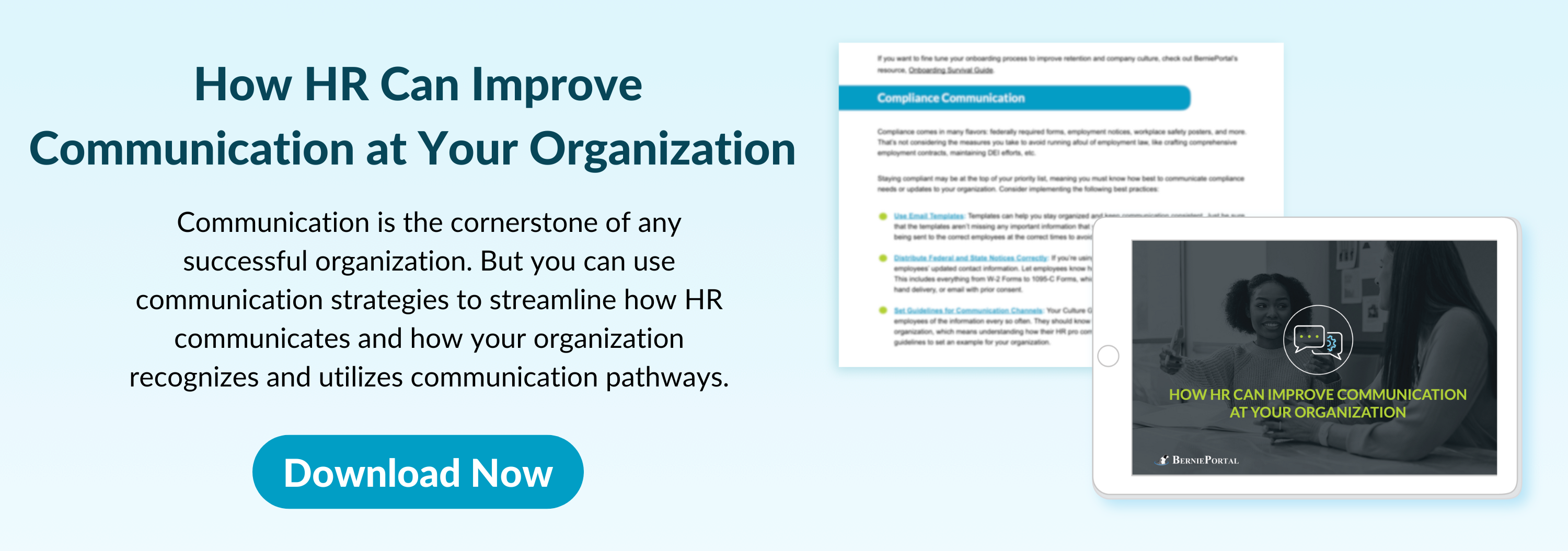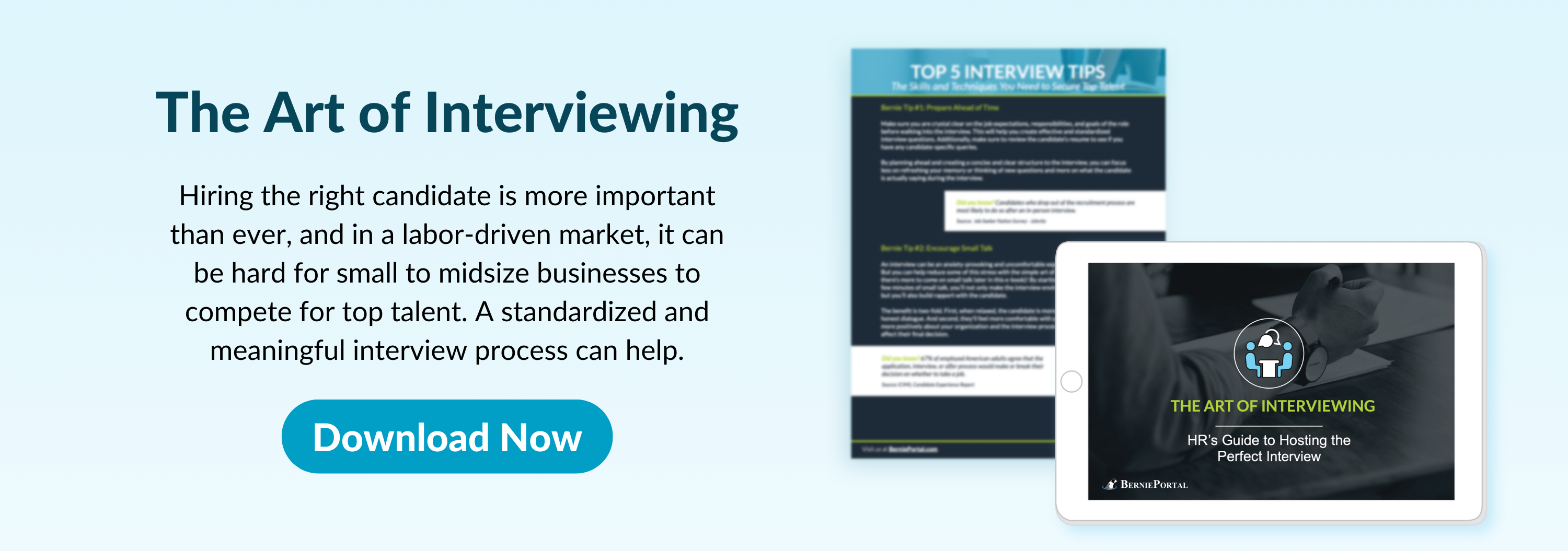Written by
Will Miranne
Will is an aPHR-certified writer on the marketing team at BerniePortal. He writes about healthcare, human resources, and benefits.
Candidates Prefer In-Person Interviews—But Is It Bad for DEI?

Recent surveys have shown that most candidates prefer in-person interviews. However, there are concerns about whether these interviews are equitable and free of bias compared to other kinds.
Read on to learn more about what research says and ways that you can successfully conduct interviews without fear of bias.
Why Do Candidates Prefer In-Person Interviews?
A survey by Yoh discovered that of the more than 2,000 surveyed candidates, 62% preferred their interviews to be face-to-face.
Some of the most significant reasons for preferring in-person interviews were increased connection with the person interviewing them. When an interview is conducted virtually, there is an inevitable disconnect between the two parties. Even if you do an excellent job of asking the right questions and responding to the hiring manager, a level of disconnect will remain present that would not exist if you were face-to-face.
Another reason candidates prefer in-person interviews is to avoid any technical complications. Technical glitches may not always be an issue, but the possibility almost always exists. Examples may include:
-
Loss of power
-
A drop in internet connection
-
Loud background noise
-
Speaker or microphone malfunctions
While these issues probably occur on rare occasions, they can cause stress and undue anxiety for a candidate trying to make an excellent first impression by nailing their interview.
The third reason surveyed individuals said they preferred in-person interviews was that it would be the only natural way to determine if the opportunity was a good fit for them. In an interview, candidates are as much interviewing the company as the company is them. Just like an organization is reaching out to many individuals, the candidates are applying for many different roles. When a candidate is not given the opportunity to see the building, office, people, and managers face-to-face, it can make it much more difficult to understand the company's culture and overall setting.
Are In-Person Interviews Harmful to DEI?
While face-to-face interviews hold a number of benefits and are even preferred by a majority of candidates, there are still concerns over the impact they could have on equity and diversity, equity, and inclusion (DEI) practices.
A recent survey by the American Staffing Association found that 74% of those identifying as Hispanic were concerned about changing their appearance for a job interview. This was a significant increase over their white counterparts. The report also found that Black Americans felt the need to shave their facial hair before their interviews, which was significantly higher than the 22% of White Americans.
Another surprising statistic is that 19% of Hispanic Americans and 17% of Black Americans felt they needed to cover their tattoos before an interview, compared to only 10% of White Americans. This trend remained similar for body piercings, with 18% of Hispanic Americans feeling the need to remove their body piercings, along with 14% of Black Americans and only 9% of White Americans.
It is clear that there is a racial imbalance in the interview process. Many individuals fear inequity when they arrive for their in-person interview, raising flags as to whether the process is fair.
Research does show that those of color receive more critical judgment based on their appearance, indicating apparent bias.
Bills such as the CROWN Act, which prevents organizations from discriminating against employees for the style or texture of their hair, have set out to nullify these biases and create a more equitable hiring process. But this does not entirely solve the problem. There is still bias, and candidates are still concerned about appearing the correct way to impress during their interviews.
→ Stay prepared for HR challenges this year. Download Now: State of HR 2023 [Free Survey Report]
How to Mitgate DEI Concerns During the Interview Process?
Companies can ensure they are using good DEI practices by conducting an initial phone interview. This will prevent hiring managers from seeing the candidate until they have passed through an initial round of interviews. Many companies may already host a phone interview, and if that is the case, it may be worth adding a second phone interview to delve more deeply into the candidate's experience and skills. Then bring the candidate in for a final interview. This will help ensure that all candidates are seen first and foremost by their skills and capabilities rather than their skin or appearance.
Focus questions and comments on skills, experience, and accomplishments. Avoid any remarks about appearance. This can seem obvious, but even comments intended as compliments can send the message that you are looking at how they are dressed or appear.
Conduct manager and recruiter training that streamlines the hiring process from a DEI perspective. All staff who will conduct interviews should be trained and briefed on the correct procedures so that even the smallest biases can be mitigated. Training videos, demonstrations, and interactive role-play can help ingrain this philosophy into the heads of your hiring team.
Culture is another area where change can happen. If you are concerned about your organization's openness to diversity, reevaluate and make changes. Don’t be afraid to audit your organization and question its practices. Take a look at other organizations and their cultures and determine if you are behind the ball or creating an unconscious bias that you didn't even realize existed. Change begins at the top, so ensure that the C-suite, managers, and HR professionals are all on the same page with the goal of building an equitable place of work for all employees.
Additional Resources
You can also stay informed, educated, and up-to-date with DEI and other important topics by using BerniePortal’s comprehensive resources:
-
BernieU—free online HR courses, approved for SHRM and HRCI recertification credit
-
BerniePortal Blog—a one-stop-shop for HR industry news
-
HR Glossary—featuring the most common HR terms, acronyms, and compliance
-
HR Guides—essential pillars covering an extensive list of comprehensive HR topics
- HR Party of One—our popular YouTube series and podcast, covering emerging HR trends and enduring HR topics

Written by
Will Miranne
Will is an aPHR-certified writer on the marketing team at BerniePortal. He writes about healthcare, human resources, and benefits.
Related Posts
Thomas J. Peters, best known for his book In Search of Excellence, once stated, “The day...
The first impression an employer makes is just as important (if not more important) than...
Organizations usually take one of four major approaches when talking about pay.
SHRM states that for HR, overlooking social media today would be like “ignoring e-mail 20...







Submit a Comment